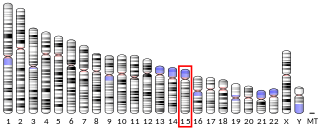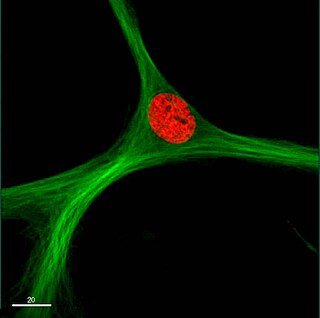Viroids are small single-stranded, circular RNAs that are infectious pathogens. Unlike viruses, they have no protein coating. All known viroids are inhabitants of angiosperms, and most cause diseases, whose respective economic importance to humans varies widely. A recent metatranscriptomics study suggests that the host diversity of viroids and other viroid-like elements is broader than previously thought and that it would not be limited to plants, encompassing even the prokaryotes.

Baculoviridae is a family of viruses. Arthropods, among the most studied being Lepidoptera, Hymenoptera and Diptera, serve as natural hosts. Currently, 85 species are placed in this family, assigned to four genera.

The codling moth is a member of the Lepidopteran family Tortricidae. They are major pests to agricultural crops, mainly fruits such as apples and pears. Because the larvae are not able to feed on leaves, they are highly dependent on fruits as a food source and thus have a significant impact on crops. The caterpillars bore into fruit and stop it from growing, which leads to premature ripening. Various means of control, including chemical, biological, and preventive, have been implemented. This moth has a widespread distribution, being found on six continents. Adaptive behavior such as diapause and multiple generations per breeding season have allowed this moth to persist even during years of bad climatic conditions.

Tomato bushy stunt virus (TBSV) is a virus of the tombusvirus family. It was first reported in tomatoes in 1935 and primarily affects vegetable crops, though it is not generally considered an economically significant plant pathogen. Depending upon the host, TBSV causes stunting of growth, leaf mottling, and deformed or absent fruit. The virus is likely to be soil-borne in the natural setting, but can also be transmitted mechanically, for example through contaminated cutting tools. TBSV has been used as a model system in virology research on the life cycle of plant viruses, particularly in experimental infections of the model host plant Nicotiana benthamiana.
Cydia pomonella granulovirus (CpGV) is a granulovirus belonging to the family Baculoviridae. It has a double-stranded DNA genome that is 123,500 base pairs in length with 143 ORFs. The virus forms small bodies called granules containing a single virion. CpGV is a virus of invertebrates – specifically Cydia pomonella, commonly known as the Codling moth. CpGV is highly pathogenic, it is known as a fast GV – that is, one that will kill its host in the same instar as infection; thus, it is frequently used as a biological pesticide.
Turnip crinkle virus (TCV) is a plant pathogenic virus of the family Tombusviridae. It was first isolated from turnip.
Animal viruses are viruses that infect animals. Viruses infect all cellular life and although viruses infect every animal, plant, fungus and protist species, each has its own specific range of viruses that often infect only that species.

Neutral alpha-glucosidase C is an enzyme that in humans is encoded by the GANC gene.

Nudiviruses are a family of animal viruses that constitute the family Nudiviridae. Insects and marine crustaceans serve as natural hosts. There are 11 species in this family, assigned to 4 genera. Diseases associated with this family include: death in larvae, chronic disease in adults.

Karl Maramorosch was an Austrian-born American virologist, entomologist, and plant pathologist. A centenarian and polyglot, he conducted research on viruses, mycoplasmas, rickettsiae, and other micro-organisms; and their transmission to plants through insect vectors in many parts of the world. He is the co-author of a textbook on techniques in virology and is the author of numerous papers on the biology and ecology of plant viruses, their hosts, and vectors. He received the Wolf Prize in Agriculture in 1980 for his contribution to the study of crop pathogens.

Baculovirus gene transfer into Mammalian cells, known from scientific research articles as BacMam, is the use of baculovirus to deliver genes to mammalian cells. Baculoviruses are insect cell viruses that can be modified to express proteins in mammalian cells. The unmodified baculovirus is able to enter those cells; however, its genes are not expressed unless a mammalian recognizable promoter is incorporated upstream of a gene of interest. Both unmodified baculovirus and its modified counterpart are unable to replicate in humans and are thus non-infectious.
Hytrosaviridae is a family of double-stranded DNA viruses that infect insects. The name is derived from Hytrosa, sigla from the Greek Hypertrophia for 'hypertrophy' and 'sialoadenitis' for 'salivary gland inflammation.'

Zhu Jiming, better known in English as Chi-Ming Chu, was a Chinese virologist. He was a member of the Chinese Academy of Science and an Honorary Member of the American Society for Microbiology.

Betabaculovirus is a genus of viruses, in the family Baculoviridae. Arthropods serve as natural hosts. There are 26 species in this genus.

Reinhard Dallinger is an Italian-born Austrian zoologist and professor of zoology and ecotoxicology at the University of Innsbruck. He works in the field of biochemistry and physiology of trace element metabolism of invertebrate animals and in the field of environmental toxicology of metals in terrestric and aquatic habitats.

The College of Science is a college within the University of Notre Dame. The Dean of the College of Science is Santiago Schnell, appointed Sept 1st, 2021.
James A. Robb is an American pathologist and molecular virologist.
Helicoverpa zea nudivirus 2 is an enveloped, rod-shaped, nonoccluded, double stranded DNA (dsDNA) sexually transmitted virus whose natural host is the corn earworm moth. At about 440 by 90 nm, it is the causative agent of the only sexually transmitted viral disease of any insect. It was originally identified in a colony of corn earworm moths established and maintained in Stoneville, Mississippi, U.S. and was found to be responsible for the sterility of those infected.
Max Duane Summers is an American molecular biologist and inventor, known for his work on the Baculovirus Expression Vector System (BEVS).










